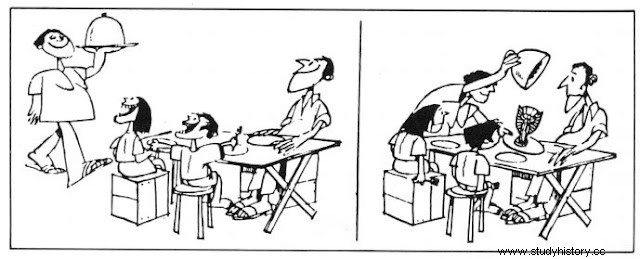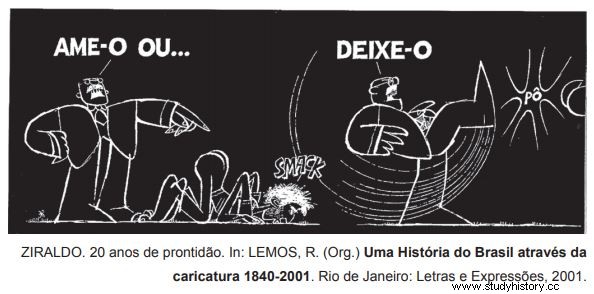(Visão Magazine, page 47, 1974) The phrase uttered, according to sources at the time, by then president Emílio Garrastazu Médici, referred to
Question 03 - UFF/1997 - 1st Stage - "Brazil, love it or leave it" was one of the famous slogans of the military regime, around 1970, when the Medici Government promoted the image of "Great Brazil" and proclaimed the "Economic Miracle" that would make the country a great power. Mark the option that correctly characterizes the economic policy corresponding to the so-called "Miracle".(A) Merger of industrial and banking capital, generating monopolies capable of imposing inflationary prices, which resulted in economic growth and an increase in the consumer market in large centers (B) Development of infrastructure works, such as hydroelectric plants and highways, based on national savings and investment from public banks. (C) Economic growth and heating of the durable goods market anchored in redistributive wage policies and in the indexation of financial market returns. (D) High investments in the capital goods sector and in the automobile industry combined with vigorous medium-sized commercial agriculture.
Question 04 - Mackenzie 2001 - Phrases such as “Nobody holds this country”, “Brazil love it or leave it” and “Prá Frente Brasil” marked a post-64 military cycle government that, using censorship and an efficient propaganda machine, presented the country as an island of peace and prosperity on the way to becoming a great power, hiding the repression and inequalities of the economic model. This is the government of:a) Humberto de Alencar Castelo Branco.b) João Batista Figueiredo.c) Artur da Costa e Silva.d) Ernesto Geisel.e) Emílio Garrastazu Médici.
Question 05 - FCC - 2010 - Civil House-SP - Consider the charge and the text.
 (Ziraldo. In:Edgard Luiz de Barros. The military governments. São Paulo:Contexto, 1992 p. 70 )
(Ziraldo. In:Edgard Luiz de Barros. The military governments. São Paulo:Contexto, 1992 p. 70 )In the Medici government, social misery strangled millions of people, pushed to the outskirts of large cities. The analysis of the cartoon and the historical knowledge allow us to infer that in the government to which the text refers(A) the ideals of a policy of income distribution through propaganda, created by the military regime, of the victory of the Brazilian selection of soccer in the 1970 World Cup.(B) the aim was to demystify the victory of the Brazilian soccer team in the 1970 World Cup, with the exposure of the population's misery, resulting from the economic policy of the military regime.(C) the illusion created for the victory of the Brazilian soccer team in the 1970 World Cup, used as a powerful instrument of political propaganda by the military regime. (D) the victory of the Brazilian soccer team in the 1970 World Cup was publicized, as a strategy of the military regime to instill cultural habits of the elite and reduce poverty. (E) the victory of the Brazilian soccer team in the 1970 World Cup to the military regime's concern to create social policies to reduce social inequalities.
 a) growth in wages and a climate of economic euphoria, at the same time as major works were carried out, such as the Transamazonica and the construction of the Itaipu hydroelectric plant, with repression of the armed struggle (“order and progress”).
a) growth in wages and a climate of economic euphoria, at the same time as major works were carried out, such as the Transamazonica and the construction of the Itaipu hydroelectric plant, with repression of the armed struggle (“order and progress”). 
A) the exiles were expelled because they had no love for their country.
B) the path for opposition movements was the country's flight.
C) love for the country was a feeling despised by the military regime.
D) government propaganda concealed the regime's authoritarian posture.
E) the passivity of the Brazilian people was harmful to the development of the nation.
Question 11 - VUNESP - 2014 - MPE-SP - The economic development and growth arising from the stabilization of the economy contributed to governmental stability. The Medici government went down in history as the period in which the highest rates of development and economic growth in the country were recorded. However, this phase of prosperity of the Brazilian economy had many more external (international) causes than internal ones. The social and economic cost for the country was very high. The brutal concentration of income prevented the lower classes from improving their living conditions. Social inequalities and poverty increased in this period.
(Renato Cancian, http://educacao.uol.com.br/disciplinas/historia-brasil/governo-medici-1969-1974. Accessed on 24.03.2014. Adapted ) The events described in the text became known by the name of (A) national security doctrine.
(B) Brazilian economic miracle.
(C) salvation policy.
(D) basic reforms .
(E) goal plan.
Question 12 - FUVEST 2016 - THE WEAPON OF PROPAGANDA
The Medici government did not limit itself to repression. He clearly distinguished between a significant but minority sector of society, opponents of the regime, and the mass of the population that lived day to day with some hope in these years of economic prosperity. Repression ended the first sector, while propaganda took care of, at least, gradually neutralizing the second. To reach this last objective, the government relied on the great advance of telecommunications in the country, after 1964. The personal credit facilities allowed the expansion of the number of residences that had television:in 1960, only 9.5% of urban residences had television; in 1970, the percentage reached 40%. At that time, benefiting from the support of the government, for which they became the spokesperson, TV Globo expanded to become a national network and practically control the sector. Government propaganda now had a channel of expression like never before in the country's history. The promotion of the “Great Power Brazil” was carried out by the Special Public Relations Office (AERP), created in the Costa e Silva government, but which did not have any importance in that government. It was the time of the “Nobody holds back this country”, by the marchinha Prá Frente, Brazil, which rocked the great Brazilian victory in the 1970 World Cup.
Boris Fausto, História do Brasil. Adapted
The strategy of domination employed by the Medici government, as described in the text, resembles, above all, the following recommendation made to the prince or ruler by a famous political thinker:
a) “The prince to make himself feared, so that, if he does not make himself loved, at least avoid hatred, for it is easy to be both feared and not hated.”
b) “The evil that one has to do, must the prince do it at once; good, you must do it little by little (...)”.
c) “We cannot leave the task of solving all things to time, because time carries everything forward and can transform good into evil and evil for good.”
d) “Anyone who believes that new benefits can make great characters forget the old injuries (...)” is wrong.
e) “The prince, above all, must not touch someone else's property, because men forget the death of their father more quickly than the loss of property.”
INTRODUCTION 01 - C02 - D03 - E04 - E05 - C06 - D07 - C08 - E
09 - D
10 - D
11 - B
12 - B
13 - C
14 - B
15 - C16 - B
